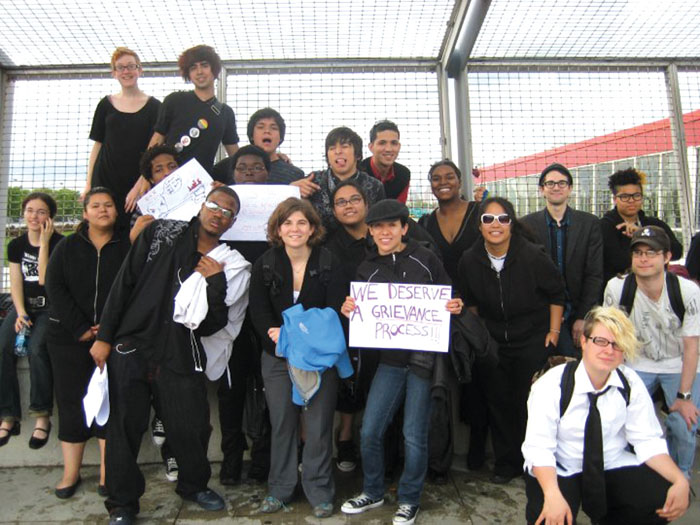Gender JUST carried out its third direct action against CPS May 13. The local grassroots organization has been waging a campaign for a grievance process that would allow LGBTQ students in Chicago public schools (CPS) to record the harassment they suffer and for greater awareness facing these students overall. According to the group, it has been unsuccessfully attempting for nearly a year to get Ron Huberman, chief executive officer of CPS, to agree to the institution of this process. Finally, feeling that it was being stalled and that talks had broken down, the group has, in recent weeks, been engaging in direct action protests against CPS and Huberman.

In last week’s action, the group targeted Huberman’s appearance at a fundraiser hosted by the Peace and Education Coalition at the U.S. Cellular Field Stadium Club. Windy City Times spoke to members Sam Finkelstein and Emily Manes after the fact, and also contacted Monique Bond, CPS communications officer. [Disclosure: this reporter is a member of Gender JUST]
According to Finkelstein, the group went up to Huberman as he attempted to enter the club, and kept chanting slogans as they delivered a set of grievances recorded by LGBTQ students. Asked why they chose this particular event, Finkelstein said, “the school-going youth in Gender JUST felt that the award was undeserved; they were experiencing the opposite of peace and the person who has the power to do something about it is doing nothing. [Huberman] is really part of the problem.” According to him, Arne Duncan, the previous CEO, had also been offered a similar award but had turned it down, saying that he could not accept it in good conscience when CPS students were facing high rates of violence. Finkelstein said that recent research by GLSEN showed that 80 percent of LGBTQ students experienced some form of violence, whether physical or verbal.
Asked about the protest, Bond said, “What I do know about our attempts to dialogue with the students and the group is that they have been a bit unreasonable. Their approach has been one of protest. We hear their concerns and have every desire to talk to the students; we are not ignoring them.” Asked about what CPS might do to institute a grievance process, she said, “I don’t mean to minimize the issues; however, we have a number of pressing issues [like] the budget and the state deficit. [Huberman’s] attention has been somewhat distracted.” She referred to the ongoing matter of teacher layoffs and school closures. Bond insisted that the issue of violence was not being ignored but that she could not commit to a timeline regarding the institution of the grievance process.
Asked to respond to Bond’s description of the protests and the issue, Finkelstein said “ [CPS continues] to use the budget as an excuse for not dealing with the issue of school violence.” He said he was “not surprised that they think it’s unreasonable to protest and tell the truth” and that the group was drawing on a long tradition of direct action that went back to the AIDS protests of the 1980s and further back to the civil rights era when ‘ “significant gains were only secured through direct action when people were pushed against the wall. The only power at our disposal is that of direct action. We are going to continue to put pressure on them through any means possible until they follow through.” He also said, “After nine meetings, they failed to live up to any of the commitments that they made. The youth decided the only way to move bureaucracy is by building momentum, getting allies and forcing them to respond through direct action.”
Emily Manes, a Gender JUST member and student teacher in CPS, said that she felt that the action was successful in showing Huberman that they were serious. According to her, success was indicated by the fact that “the very next day, Drew Berris [special assistant to the CEO] e-mailed us, saying that he wants a formal request for the grievance process in writing.” Asked about the issue of dialogue, Manes said that “the protests might not be conducive to dialogue, but they are conducive to getting things done.”
Manes gave an example of her own experience in CPS to illustrate the need to address heterosexism and homophobia in schools. She spoke of how one male student in the second grade had come up to her and complained that another male student “likes me in a nasty kind of way.” Afterwards, the boy referred to by the first student came crying to her saying that he had been treating him badly. Manes said, “Kids are learning that kind of homophobia even at that young age.”